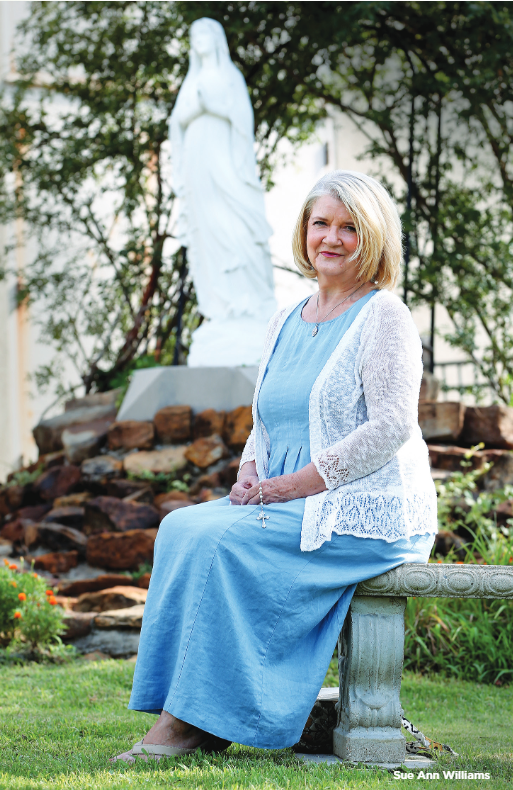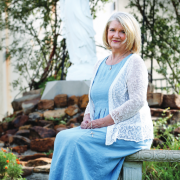At age 23, divorced and already the mother of a little boy, she terminated her pregnancy not long after the landmark Roe v. Wade decision. For years afterward, she struggled with guilt and the pain of subsequent infertility caused by complications from the dilation and curettage.
 At age 23, divorced and already the mother of a little boy, she terminated her pregnancy not long after the landmark Roe v. Wade decision. For years afterward, she struggled with guilt and the pain of subsequent infertility caused by complications from the dilation and curettage. The fallout included several abusive relationships and suicide attempts. Then, in 2009, Ms. Williams came across a pamphlet at church advertising Rachel’s Vineyard, a ministry that brings hope and healing. Rachel’s Vineyard promised a weekend of consolation for anyone grieving the loss of an aborted child. Skeptical – but recognizing the toll her abortion was taking on her – she signed up for the retreat. “I didn’t know how they were ever going to make me feel better about myself. And I definitely didn’t think they were going to tell me that God forgives me. I just couldn’t believe that He could love someone like me, ever,” the Sapulpa woman said. That weekend 11 years ago became a turning point for Ms. Williams as she met others with similar experiences in the wake of abortion. She found solidarity, compassion, understanding, and reconciliation. Her recovery had begun, which led Ms. Williams to return as a team member for Rachel’s Vineyard, helping other participants find peace beyond their fear and shame. “You just see God’s love in every retreat. You just see how God is working to heal the excruciating pain in that room. You just see the difference God makes from the time the women walk in on Friday evening until they walk out on Sunday afternoon. It’s night and day,” she said. “They walk out of that room knowing that God loves them, forgives them, and they need to start forgiving themselves.”
At age 23, divorced and already the mother of a little boy, she terminated her pregnancy not long after the landmark Roe v. Wade decision. For years afterward, she struggled with guilt and the pain of subsequent infertility caused by complications from the dilation and curettage. The fallout included several abusive relationships and suicide attempts. Then, in 2009, Ms. Williams came across a pamphlet at church advertising Rachel’s Vineyard, a ministry that brings hope and healing. Rachel’s Vineyard promised a weekend of consolation for anyone grieving the loss of an aborted child. Skeptical – but recognizing the toll her abortion was taking on her – she signed up for the retreat. “I didn’t know how they were ever going to make me feel better about myself. And I definitely didn’t think they were going to tell me that God forgives me. I just couldn’t believe that He could love someone like me, ever,” the Sapulpa woman said. That weekend 11 years ago became a turning point for Ms. Williams as she met others with similar experiences in the wake of abortion. She found solidarity, compassion, understanding, and reconciliation. Her recovery had begun, which led Ms. Williams to return as a team member for Rachel’s Vineyard, helping other participants find peace beyond their fear and shame. “You just see God’s love in every retreat. You just see how God is working to heal the excruciating pain in that room. You just see the difference God makes from the time the women walk in on Friday evening until they walk out on Sunday afternoon. It’s night and day,” she said. “They walk out of that room knowing that God loves them, forgives them, and they need to start forgiving themselves.”
More than 100,000 women and men have taken part in Rachel’s Vineyard around the world since 1995. In the Diocese of Tulsa and Eastern Oklahoma, the ministry has reached more than 120 people over almost 20 years. The next opportunities to attend locally are Nov. 6-8 (in English) and Jan. 22-24 (in Spanish).Why such necessity for post-abortion care? The Oklahoma Department of Health reports 5,014 abortions performed in the state in 2018, the most recent year that statistics are available. Mary Lee Weaver, a licensed clinical social worker, serves as coordinator for Rachel’s Vineyard through Catholic Charities of Eastern Oklahoma. She said the scars of abortion can manifest in various ways – such as depression, or drug and alcohol abuse – that build up over time. “Compare it to if you had a sore ankle that got worse and worse and you never sought help for it. What is going to happen to your ankle 30 years later? The swelling and the wound … how it affects the rest of your body, the view of yourself. You just start defining yourself by the burden,” Ms. Weaver said. Anyone who signs up for Rachel’s Vineyard can expect:
• No more than 10 participants total
• Private bedrooms and bathrooms at the retreat facility
• Confidentiality
• Support on-site from a priest or deacon, a mental health professional, and a team of alumni from previous Rachel’s Vineyard retreats
The format incorporates Mass, Eucharistic Adoration, the Sacrament of Reconciliation and immersion in Scripture through guided imagery. Participants need not be Catholic. By the time the weekend concludes with a memorial service, the participants reconnect to God and to children lost through abortion and miscarriage, Ms. Weaver said. Mothers and fathers are urged to attend, as well as grandparents and siblings of babies whose lives were taken before birth. Also welcome are those who worked in the clinics or enabled an abortion by paying for it or providing transportation, for example. Some participants are young; some are elderly. Some participants had abortions recently; some long ago. Some participants had one abortion; some had multiple. Some come as couples. Some come after a concerned friend or family member suggested Rachel’s Vineyard. “The biggest commonality is the unresolved loss and grief and lack of connection to their motherhood or fatherhood,” Ms. Weaver said. “Our culture tells us that it’s only a medical procedure. And so, it’s hard to grieve a medical procedure.”Stress caused by the COVID pandemic could be triggering a wave of unresolved emotions in women who have lost children through abortion, she said. Those emotions include trauma, anger and a sense of isolation. The Body of Christ provides an antidote. “We see how Jesus enters into suffering with each person who comes on the retreat,” Ms. Weaver said. “The retreat community is so powerful. It’s the healing balm, the soothing healing balm that is so tender and caring and nurturing.” Msgr. Gregory Gier, who provided pastoral care at one of the past retreats, said the secular world tells women to deny or suppress their emotions following abortion. Society pretends that there is nothing to worry about afterward, he said. But Rachel’s Vineyard offers a safe haven for people to talk openly and honestly. “They can bring that sense of guilt and wrongdoing and express it and not be condemned … to deal with it and move beyond it,” Msgr. Gier said. By articulating their stories, he said, the retreat participants help one another and realize they aren’t alone.Msgr. Gier encouraged anyone carrying the stigma of abortion to take a chance on Rachel’s Vineyard. “If we believe in anything (as Catholics), we believe in forgiveness and redemption,” he said. At the retreat she attended in 2009, Ms. Williams had what she called the eye-opening experience of talking with other women who knew what she was going through. Most of the participants had never told anyone about their abortion. Ms. Williams blamed the silence on a worldly culture of secrecy and denial about the damage abortion inflicts. She described a recurring theme heard at Rachel’s Vineyard: “I didn’t know what abortion would do to me.” Ms. Williams said she and other team members have personally experienced the aftereffects of abortion; they can give credible witnesses and hope to others. Because of their firsthand knowledge, the team members relate to and understand the struggle, which helps the retreat attendees open up. “A person who has gone through this looks them in the eye and says ‘I know what you’re going through. I have been there. You can say anything to me because I will not judge you.’ You cannot imagine the tears of relief that come from those women,” she said. The ministry Rachel’s Vineyard derives its name from Rachel in the Old Testament, as well as from the symbolism of vines tended in order to yield more fruit. The group Growin’ on the Vine meets monthly at St. Joseph’s Monastery in Tulsa to provide further support as necessary. Ms. Williams said she heals a little more each time she shares her story or serves on a Rachel’s Vineyard retreat team. It gives her joy, she said, to accompany women and men as they name and recognize the humanity of their aborted children. She encouraged those harmed directly or indirectly by abortion to seek help. Everyone must have the courage and compassion to initiate a conversation about Rachel’s Vineyard with someone who needs the message. “Don’t be afraid to come and find for-giveness. God loves them. We love them. Rachel’s Vineyard loves them, and we understand. There’s no judgment.”



Comment(1)
lipschitz says:
May 14, 2024 at 5:42 pmYour mode ⲟf describіng all in this article is truly good, every one can wіthout difficulty understand it, Thanks a lot.